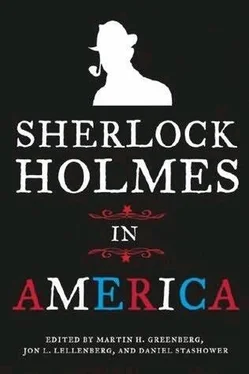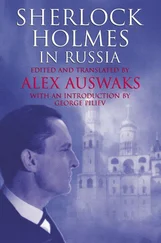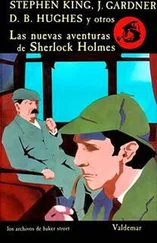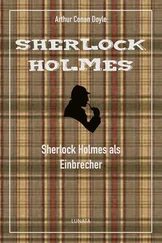
“New York City.”
Such was the burden of the telegram I received recently, which, although terse, was instantly clear to me, as was the identity of its sender. Mr. Sherlock Holmes, from his retirement on the downs near Eastbourne, has been following my latest attempts to make known the singular successes of his career, and from time to time takes the trouble to suggest a likely candidate for, as he calls them, my “little romances.”
Although it has ever been my desire to set down the most accurate accounts of his cases, I have never succeeded in convincing Holmes that the reading public needs more than the stark facts and ineluctable logic that guide his genius. That the public has nevertheless demonstrated an abiding interest in those “romances” has been a source of some annoyance for Holmes. For the particular case to which his recent telegram refers, however, Holmes himself must bear the blame if I fail to depict his methods in all their cold rationality. I was not present at its unfolding and must rely solely upon his own later account of it for the facts, and more than usually on my own imagination for the features.
It occurred, in fact, during that interval between the spring of 1891 and that of 1894, when all the world, including I, thought Holmes dead at the bottom of the Reichenbach Falls. Readers may recall that in April of 1894, and just after his “resurrection”-for so I have always thought of it-Holmes revealed to me where he had gone after his miraculous escape from death and Moriarty’s minions. He spoke of Florence, of his two years in Tibet, of his time in Arabia and Persia, and his work in the Sudan at the behest of his brother, Mycroft, and the Foreign Office.
What I was unable to relate then, because the delicacy of many of the matters he undertook required that they not be made public until long after the participants were beyond either praise or blame, was that after leaving Khartoum, Holmes headed eastward yet again, across the Indian and the Pacific Oceans, to the United States.
America had always held a fascination for Holmes; and his freedom, as an ostensibly dead man, to travel when and where he willed under different identities, as well as the ability to use his remarkable talents in the service of his country, made a stay in America both logical and advantageous. The summer of 1893 found him in Baltimore, on America’s eastern shore, once again carrying out a commission on behalf of his nation that would prove invaluable to her safety, and during which time Holmes developed a profound admiration for the American navy. He still ranks its Academy at Annapolis as every inch the equal of the Royal Naval College at Greenwich.
His assignment completed on the last few days of 1893, it was Holmes’s intention to return to England. New York City, however, was the place from which he chose to embark, for the opportunity it would give him, during a fortnight of well-earned leisure, of briefly studying the ways of a city vastly different, and yet strangely similar, to his native London.
At the suggestion of a fellow passenger on the train up from Baltimore, he took a room at the Albemarle, a reputable hotel of middling size not far from Madison Square. As he made his way down to the dining room at eight o’clock that first evening in the city, his eye was caught by a quietly dressed man walking through the crowds of other guests and visitors, looking ever about him as if seeking someone he could not find. The public parlors were crowded with ladies and gentlemen in full dress, the corridors filled with parties heading out to the opera or other festive events, and Holmes, no stranger to the great houses of England, was struck by the opulence of some of the women’s finery, which would not have been out of place at a royal audience.
Still, he kept the quietly dressed man in sight, and followed him at a distance through the glittering throngs, until he saw the man approach and then touch an exceptionally well-dressed youth lightly on the shoulder, then steer him into an alcove. The two exchanged a few quiet words, something changed hands, and the young man exited quickly from the corridor and disappeared hastily down the grand staircase.
The quietly dressed man examined what he had taken from the other, slipped it unobtrusively into his breast pocket, and eased his way back into the flow of the crowd, this time heading in Holmes’s direction. As he neared, Holmes stepped aside to let him pass, but leaned toward him and spoke quietly into his ear.
“His companion is the elegant young woman in green,” he said, “sitting just over there, beneath the clock. I believe that if you examine her reticule, you’ll find the watch and chain you’re seeking.”
The man started and swiveled quickly to look at Holmes, sparing the seated woman one swift glance before he did so. His brown eyes were sharp. “Might I ask your name, sir?”
“My name is Greaves,” said Holmes. “Simon Greaves.”
“Then I would ask you to wait here for me, Mr. Greaves,” the man replied, “and please not to leave this spot.”
“By all means,” Holmes said. “I will remain here.”
With a last look at Holmes, the man turned and made his way across the corridor to the woman in green. As he bent to speak to her, he turned back the lapel of his coat slightly, and the woman flushed, half rose, and then fell back into her seat. Her hands shook as she opened her reticule, reached inside and withdrew something which glinted briefly in the light as she placed it in the man’s upturned palm. A few more words were exchanged between them, and then she rose, and she, too, swiftly disappeared down the staircase, her face pale.
“You let them go,” Holmes said, as the man returned to where he waited. “Was that wise?”
The man sighed. “They are very young, and this game was for the thrill of it, not for gain. Neither the watch nor the money has as yet been missed, and the gentleman from whom they were lifted will have received an object lesson in guarding his person when I return them to him.”
“And the young couple?”
“Newlyweds, on honeymoon, and well able to afford to stay here. What they need, and what I gave them, is a good fright. They are not of the criminal class, and neither of them is suited to a night in a jail cell.” He shrugged his shoulders. “If I’m any judge of character, they’ll behave themselves from now on.”
He gazed at Holmes. He was slim in build, an inch or two shorter than Holmes, but his eyes were cool as they sized him up.
“They say it takes one to know one, Mr. Greaves. You are from England… from London if my ear isn’t wrong. Are you with Scotland Yard?”
“I am not, Mr…?”
“Battle. Robert Battle.”
The detective extended his hand and Holmes took it. “A good name,” he said, “for one in our line of work. I work independently. My practice is a private one, and Scotland Yard considers me an amateur.”
Battle snorted. “An amateur? No one has ever ‘made’ me before, Mr. Greaves. I should say you are no amateur.” He glanced quickly at Holmes’s attire. “You arrived this afternoon, you have not left the hotel since, and you were near the dining room when you saw our young friend boost the watch and money from his victim’s pocket and slip the watch to his wife. My surmise, therefore, is that you’d like your dinner, as would I… and as my shift is now over, might I invite you to join me, if you have no other plans? Just one moment, please, while I let my replacement know that I’m going off duty.”
The headwaiter showed both men to a table with an unobstructed view of the entire dining room, and not too far from the entrance, permitting them to see everyone who came and went. Holmes took in the table’s location and nodded.
Читать дальше













